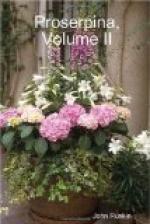4. Hermione. Fortitude and Justice personified, with unwearying affection. She is Penelope, tried by her husband’s fault as well as error.
5. Virgilia. Perfect type of wife and mother, but without definiteness of character, nor quite strength of intellect enough entirely to hold her husband’s heart. Else, she had saved him: he would have left Rome in his wrath—but not her. Therefore, it is his mother only who bends him: but she cannot save.
6. Imogen. The ideal of grace and gentleness; but weak; enduring too mildly, and forgiving too easily. But the piece is rather a pantomime than play, and it is impossible to judge of the feelings of St. Columba, when she must leave the stage in half a minute after mistaking the headless clown for headless Arlecchino.
7. Desdemona, Ophelia, Rosalind. They are under different conditions from all the rest, in having entirely heroic and faultless persons to love. I can’t class them, therefore,—fate is too strong, and leaves them no free will.
8. Perdita, Miranda. Rather mythic visions of maiden beauty than mere girls.
9. Viola and Juliet. Love the ruling power in the entire character: wholly virginal and pure, but quite earthly, and recognizing no other life than his own. Viola is, however, far the noblest. Juliet will die unless Romeo loves her: “If he be wed, the grave is like to be my wedding bed;” but Viola is ready to die for the happiness of the man who does not love her; faithfully doing his messages to her rival, whom she examines strictly for his sake. It is not in envy that she says, “Excellently done,—if God did all.” The key to her character is given in the least selfish of all lover’s songs, the one to which the Duke bids her listen:
“Mark it, Cesario,—it
is old and plain,
The spinsters and the knitters in the
sun,
And the free maids, that weave their
thread with bones,
Do use to chaunt it.”
(They, the unconscious Fates, weaving the fair vanity of life with death); and the burden of it is—
“My part of Death, no one so true
Did share it.”
Therefore she says, in the great first scene, “Was not this love indeed?” and in the less heeded closing one, her heart then happy with the knitters in the sun,
“And all those sayings will I over-swear,
And all those swearings keep as true in
soul
As doth that orbed continent the Fire
That severs day from night.”
Or, at least, did once sever day from night,—and perhaps does still in Illyria. Old England must seek new images for her loves from gas and electric sparks,—not to say furnace fire.




